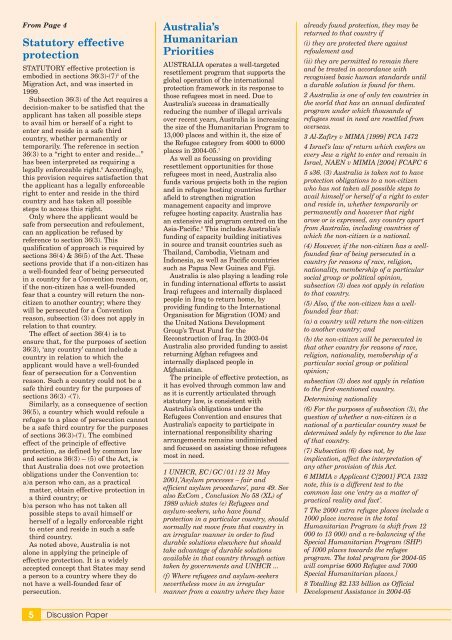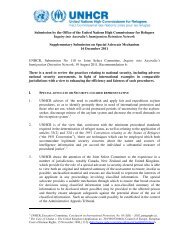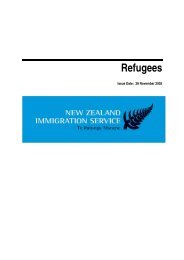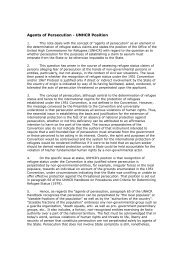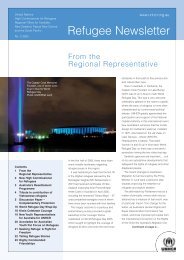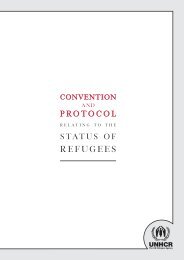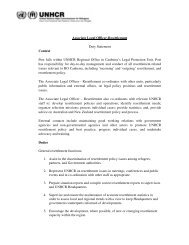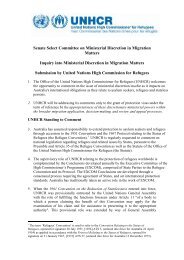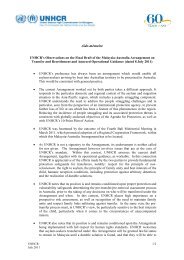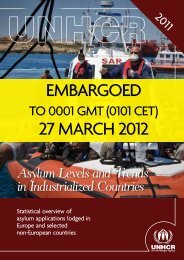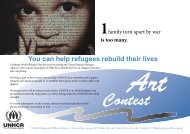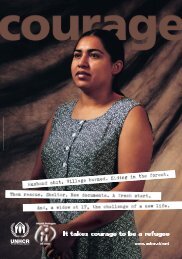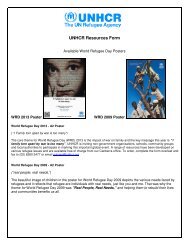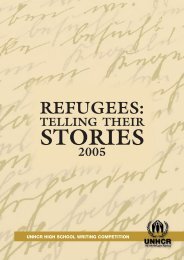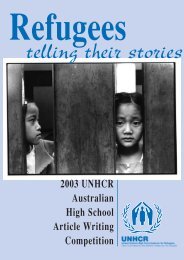download newsletter - unhcr
download newsletter - unhcr
download newsletter - unhcr
Create successful ePaper yourself
Turn your PDF publications into a flip-book with our unique Google optimized e-Paper software.
From Page 4<br />
Statutory effective<br />
protection<br />
STATUTORY effective protection is<br />
embodied in sections 36(3)-(7) 5 of the<br />
Migration Act, and was inserted in<br />
1999.<br />
Subsection 36(3) of the Act requires a<br />
decision-maker to be satisfied that the<br />
applicant has taken all possible steps<br />
to avail him or herself of a right to<br />
enter and reside in a safe third<br />
country, whether permanently or<br />
temporarily. The reference in section<br />
36(3) to a “right to enter and reside...”<br />
has been interpreted as requiring a<br />
legally enforceable right. 6 Accordingly,<br />
this provision requires satisfaction that<br />
the applicant has a legally enforceable<br />
right to enter and reside in the third<br />
country and has taken all possible<br />
steps to access this right.<br />
Only where the applicant would be<br />
safe from persecution and refoulement,<br />
can an application be refused by<br />
reference to section 36(3). This<br />
qualification of approach is required by<br />
sections 36(4) & 36(5) of the Act. These<br />
sections provide that if a non-citizen has<br />
a well-founded fear of being persecuted<br />
in a country for a Convention reason, or,<br />
if the non-citizen has a well-founded<br />
fear that a country will return the noncitizen<br />
to another country; where they<br />
will be persecuted for a Convention<br />
reason, subsection (3) does not apply in<br />
relation to that country.<br />
The effect of section 36(4) is to<br />
ensure that, for the purposes of section<br />
36(3), ‘any country’ cannot include a<br />
country in relation to which the<br />
applicant would have a well-founded<br />
fear of persecution for a Convention<br />
reason. Such a country could not be a<br />
safe third country for the purposes of<br />
sections 36(3) -(7).<br />
Similarly, as a consequence of section<br />
36(5), a country which would refoule a<br />
refugee to a place of persecution cannot<br />
be a safe third country for the purposes<br />
of sections 36(3)-(7). The combined<br />
effect of the principle of effective<br />
protection, as defined by common law<br />
and sections 36(3) – (5) of the Act, is<br />
that Australia does not owe protection<br />
obligations under the Convention to:<br />
a)a person who can, as a practical<br />
matter, obtain effective protection in<br />
a third country; or<br />
b)a person who has not taken all<br />
possible steps to avail himself or<br />
herself of a legally enforceable right<br />
to enter and reside in such a safe<br />
third country.<br />
As noted above, Australia is not<br />
alone in applying the principle of<br />
effective protection. It is a widely<br />
accepted concept that States may send<br />
a person to a country where they do<br />
not have a well-founded fear of<br />
persecution.<br />
Australia’s<br />
Humanitarian<br />
Priorities<br />
AUSTRALIA operates a well-targeted<br />
resettlement program that supports the<br />
global operation of the international<br />
protection framework in its response to<br />
those refugees most in need. Due to<br />
Australia’s success in dramatically<br />
reducing the number of illegal arrivals<br />
over recent years, Australia is increasing<br />
the size of the Humanitarian Program to<br />
13,000 places and within it, the size of<br />
the Refugee category from 4000 to 6000<br />
places in 2004-05. 7<br />
As well as focussing on providing<br />
resettlement opportunities for those<br />
refugees most in need, Australia also<br />
funds various projects both in the region<br />
and in refugee hosting countries further<br />
afield to strengthen migration<br />
management capacity and improve<br />
refugee hosting capacity. Australia has<br />
an extensive aid program centred on the<br />
Asia-Pacific. 8 This includes Australia’s<br />
funding of capacity building initiatives<br />
in source and transit countries such as<br />
Thailand, Cambodia, Vietnam and<br />
Indonesia, as well as Pacific countries<br />
such as Papua New Guinea and Fiji.<br />
Australia is also playing a leading role<br />
in funding international efforts to assist<br />
Iraqi refugees and internally displaced<br />
people in Iraq to return home, by<br />
providing funding to the International<br />
Organisation for Migration (IOM) and<br />
the United Nations Development<br />
Group’s Trust Fund for the<br />
Reconstruction of Iraq. In 2003-04<br />
Australia also provided funding to assist<br />
returning Afghan refugees and<br />
internally displaced people in<br />
Afghanistan.<br />
The principle of effective protection, as<br />
it has evolved through common law and<br />
as it is currently articulated through<br />
statutory law, is consistent with<br />
Australia’s obligations under the<br />
Refugees Convention and ensures that<br />
Australia’s capacity to participate in<br />
international responsibility sharing<br />
arrangements remains undiminished<br />
and focussed on assisting those refugees<br />
most in need.<br />
1 UNHCR, EC/GC/01/12 31 May<br />
2001,’Asylum processes – fair and<br />
efficient asylum procedures’, para 49. See<br />
also ExCom , Conclusion No 58 (XL) of<br />
1989 which states (e) Refugees and<br />
asylum-seekers, who have found<br />
protection in a particular country, should<br />
normally not move from that country in<br />
an irregular manner in order to find<br />
durable solutions elsewhere but should<br />
take advantage of durable solutions<br />
available in that country through action<br />
taken by governments and UNHCR ...<br />
(f) Where refugees and asylum-seekers<br />
nevertheless move in an irregular<br />
manner from a country where they have<br />
already found protection, they may be<br />
returned to that country if<br />
(i) they are protected there against<br />
refoulement and<br />
(ii) they are permitted to remain there<br />
and be treated in accordance with<br />
recognised basic human standards until<br />
a durable solution is found for them.<br />
2 Australia is one of only ten countries in<br />
the world that has an annual dedicated<br />
program under which thousands of<br />
refugees most in need are resettled from<br />
overseas.<br />
3 Al-Zafiry v MIMA [1999] FCA 1472<br />
4 Israel’s law of return which confers on<br />
every Jew a right to enter and remain in<br />
Israel, NAEN v MIMIA [2004] FCAFC 6<br />
5 s36. (3) Australia is taken not to have<br />
protection obligations to a non-citizen<br />
who has not taken all possible steps to<br />
avail himself or herself of a right to enter<br />
and reside in, whether temporarily or<br />
permanently and however that right<br />
arose or is expressed, any country apart<br />
from Australia, including countries of<br />
which the non-citizen is a national.<br />
(4) However, if the non-citizen has a wellfounded<br />
fear of being persecuted in a<br />
country for reasons of race, religion,<br />
nationality, membership of a particular<br />
social group or political opinion,<br />
subsection (3) does not apply in relation<br />
to that country.<br />
(5) Also, if the non-citizen has a wellfounded<br />
fear that:<br />
(a) a country will return the non-citizen<br />
to another country; and<br />
(b) the non-citizen will be persecuted in<br />
that other country for reasons of race,<br />
religion, nationality, membership of a<br />
particular social group or political<br />
opinion;<br />
subsection (3) does not apply in relation<br />
to the first-mentioned country.<br />
Determining nationality<br />
(6) For the purposes of subsection (3), the<br />
question of whether a non-citizen is a<br />
national of a particular country must be<br />
determined solely by reference to the law<br />
of that country.<br />
(7) Subsection (6) does not, by<br />
implication, affect the interpretation of<br />
any other provision of this Act.<br />
6 MIMIA v Applicant C[2001] FCA 1332<br />
note, this is a different test to the<br />
common law one ‘entry as a matter of<br />
practical reality and fact’.<br />
7 The 2000 extra refugee places include a<br />
1000 place increase in the total<br />
Humanitarian Program (a shift from 12<br />
000 to 13 000) and a re-balancing of the<br />
Special Humanitarian Program (SHP)<br />
of 1000 places towards the refugee<br />
program. The total program for 2004-05<br />
will comprise 6000 Refugee and 7000<br />
Special Humanitarian places.]<br />
8 Totalling $2.133 billion as Official<br />
Development Assistance in 2004-05<br />
5 Discussion Paper


